38 refer to the diagram for a purely competitive producer. the firm's short-run supply curve is:
late 14c., referren, "to trace back (a quality, etc., to a first cause or origin), attribute, assign," from Old French referer (14c.) and directly from Latin referre "to relate, refer," literally "to carry back," from re- "back" (see re-) + ferre "to carry, bear" (from PIE root *bher- (1) "to carry," also "to bear children"). The meaning "to commit to some authority for consideration and decision" is from mid-15c.; sense of "to direct (someone) to a book, etc." for information is from c. 1600. Related: Referred; referring.
D) new firms will enter this industry. 19. Refer to the above diagram for a purely competitive producer. The firm's short-run supply curve is: A) the abcd ...
Capitalism is an economic system based on the private ownership of the means of production and their operation for profit. Central characteristics of capitalism include capital accumulation, competitive markets, a price system, private property and the recognition of property rights, voluntary exchange and wage labor. In a capitalist market economy, decision-making and investments are ...

Refer to the diagram for a purely competitive producer. the firm's short-run supply curve is:
弦而鼓之 lit. to tune one's zither then play it; fig. to live by the consequences of one's actions/to make one's bed then lie on it 弦歌 to sing to a string accompaniment/education (a reference to teaching the people Confucian values by means of song in ancient times)
Old English for "before, in the sight of, in the presence of; as far as; during, before; on account of, for the sake of; in place of, instead of," from Proto-Germanic *fur "before; in" (source also of Old Saxon furi "before," Old Frisian for, Middle Dutch vore, Dutch voor "for, before;" German für "for;" Danish for "for," før "before;" Gothic faur "for," faura "before"), from PIE root *per- (1) "forward," hence "in front of, before," etc. From late Old English as "in favor of." For and fore differentiated gradually in Middle English. For alone as a conjunction, "because, since, for the reason that; in order that" is from late Old English, probably a shortening of common Old English phrases such as for þon þy "therefore," literally "for the (reason) that."
early 15c., "assistance, relief, act of supplying," from supply (v.). Meaning "that which is provided, quantity or amount of something provided" is attested from c. 1600. Meaning "person who temporarily takes the place of another" (especially a minister or preacher) is from 1580s. In the political economy sense (corollary of demand (n.)) it dates from 1776; supply-side (adj.) in reference to economic policy is attested from 1976; as a noun by 1922. Supplies "necessary provisions held for distribution and use" is from c. 1650.
Refer to the diagram for a purely competitive producer. the firm's short-run supply curve is:.
Short-run profits are maximized, for a perfectly competitive firm, ... and diagram "b" shows the market demand and supply curves for the market.
1510s, "one who or that which produces;" agent noun from produce (v.). Of entertainments, from 1891; in political economy, "one who causes any article to have an exchangeable value" (opposed to consumer), by 1714 (John Locke).
late 14c., "to help, support, maintain," also "fill up, make up for," from Old French soupplier "fill up, make full" (Modern French suppléer) and directly from Latin supplere "fill up, make full, complete," from assimilated form of sub "up from below" (see sub-) + plere "to fill" (from PIE root *pele- (1) "to fill"). The meaning "furnish, provide" first recorded 1520s. Related: Supplied; supplying.
73) Refer to Figure 9-1. If the firm's average total cost curve is ATC2 the firm will a. make a profit. b. break even. c. suffer a loss. d. face competition. 74) Which of the following statements applies to a monopolist but not to a per- fectly competitive firm at its profit-maximizing output? a.
The short-run supply curve of a purely competitive producer is based primarily on its: A. AVC curve. B. ATC curve. C. AFC curve. D. MC curve.
early 15c. (implied in curved), intransitive, "have or assume a curved form," from Latin curvus "crooked, curved, bent," and curvare "to bend," both from PIE root *sker- (2) "to turn, bend." Transitive sense of "cause to take the shape of a curve, bend" is from 1660s.
Based on these data, the firm should. 6. (TCO 3) A firm should always continue to operate at a loss in the short run if. 7. (TCO 3) The short-run supply curve for a competitive firm is the. 8. (TCO 3) One feature of pure monopoly is that the monopolist is. 9. (TCO 3) Barriers to entry. 10.
Refer to the above diagram for a purely competitive producer. The firm's short-run supply curve is: A. the abcd segment and above on the MC curve.
1826, "pertaining to or involving competition," from Latin competit-, past participle stem of competere (see compete) + -ive. Meaning "eager to compete, aggressive, ambitious" is by 1977. Related: Competitively; competitiveness.
Gcfa's communications and marketing department is a team of professionals committed to strategic planning and promotion of all agency departments, products, and services. With decades of experience, the team consists of professional writers, campaign strategists, and graphic designers for all the agency's creative needs.
Refer to the diagram for a purely competitive producer. The firm's short-run supply curve is: B. the bcd segment and above on the MC curve.
16.12.2021. Download eBook in Pdf/Epub/Tuebl format or Read Online
1610s, "an illustrative figure giving only the outlines or general scheme of the object;" 1640s in geometry, "a drawing for the purpose of demonstrating the properties of a figure;" from French diagramme, from Latin diagramma "a scale, a musical scale," from Greek diagramma "geometric figure, that which is marked out by lines," from diagraphein "mark out by lines, delineate," from dia "across, through" (see dia-) + graphein "write, mark, draw" (see -graphy). Related: Diagrammatic; diagrammatically. The verb, "to draw or put in the form of a diagram," is by 1822, from the noun. Related: Diagrammed; diagramming.
prefix usually meaning "away, opposite, completely," from Old English for-, indicating loss or destruction, but in other cases completion, and used as well with intensive or pejorative force, from Proto-Germanic *fur "before, in" (source also of Old Norse for-, Swedish för-, Dutch ver-, Old High German fir-, German ver-); from PIE *pr-, from root *per- (1) "forward," hence "in front of, before, toward, near, against." In verbs the prefix denotes (a) intensive or completive action or process, or (b) action that miscarries, turns out for the worse, results in failure, or produces adverse or opposite results. In many verbs the prefix exhibits both meanings, and the verbs frequently have secondary and figurative meanings or are synonymous with the simplex. [Middle English Compendium] Probably originally in Germanic with a sense of "forward, forth," but it spun out complex sense developments in the historical languages. Disused as a word-forming element in Modern English. Ultimately from the same root as fore (adv
refer to the diagram for a purely competitive producer. The firm's short-run supply curve is a) the abcd segment and above on the MC curve b) the bcd segment and above on the MC curve c) the cd segment and above on the MC curve d) not shown
... of a product sold by a purely competitive firm is $5. Given the data in the accompanying table, at what output is total profit highest in the short run?
In a competitive market, since entry or exit occurs until price equals the minimum of average total cost, the supply curve is perfectly elastic in the long run.
c. 1300, pureli, "wholly, fully, completely; actually, really, truly," from pure + -ly (2). Sense of "without physical admixture" is from c. 1500.
Refer to the above diagram for a purely competitive producer. The firm's short-run supply curve is: A. the abcd segment and above on the MC curve. B. the bcd ...




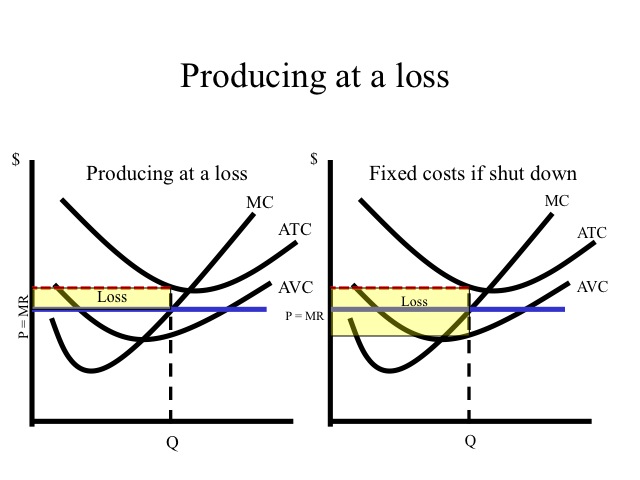



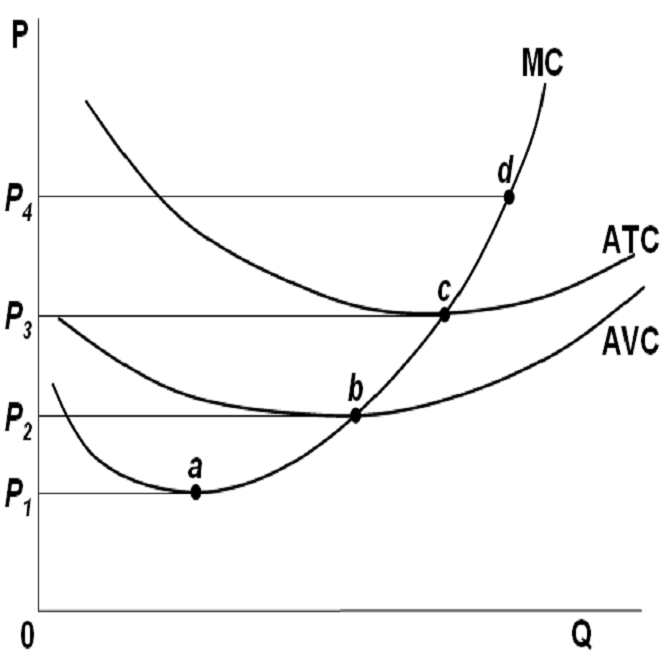
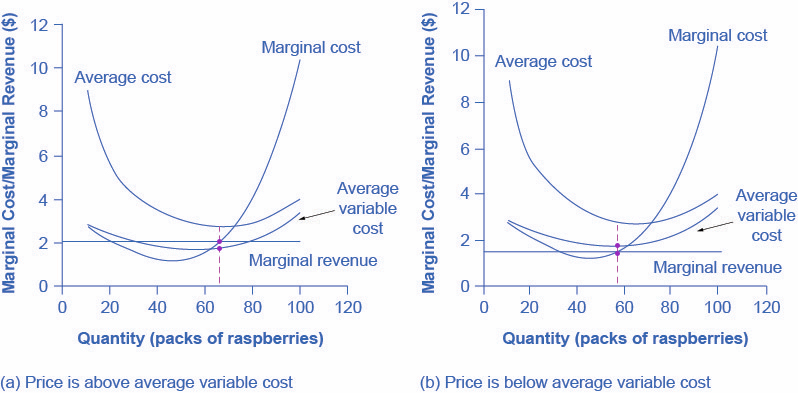
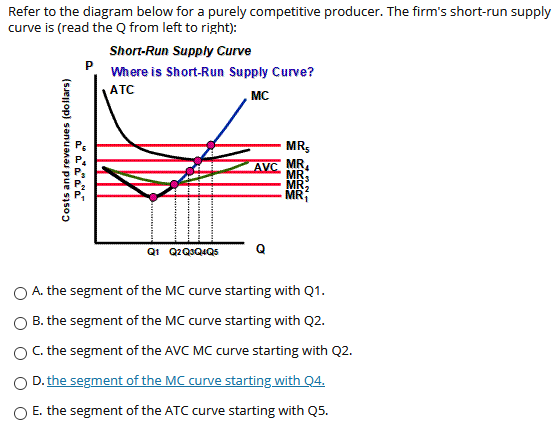

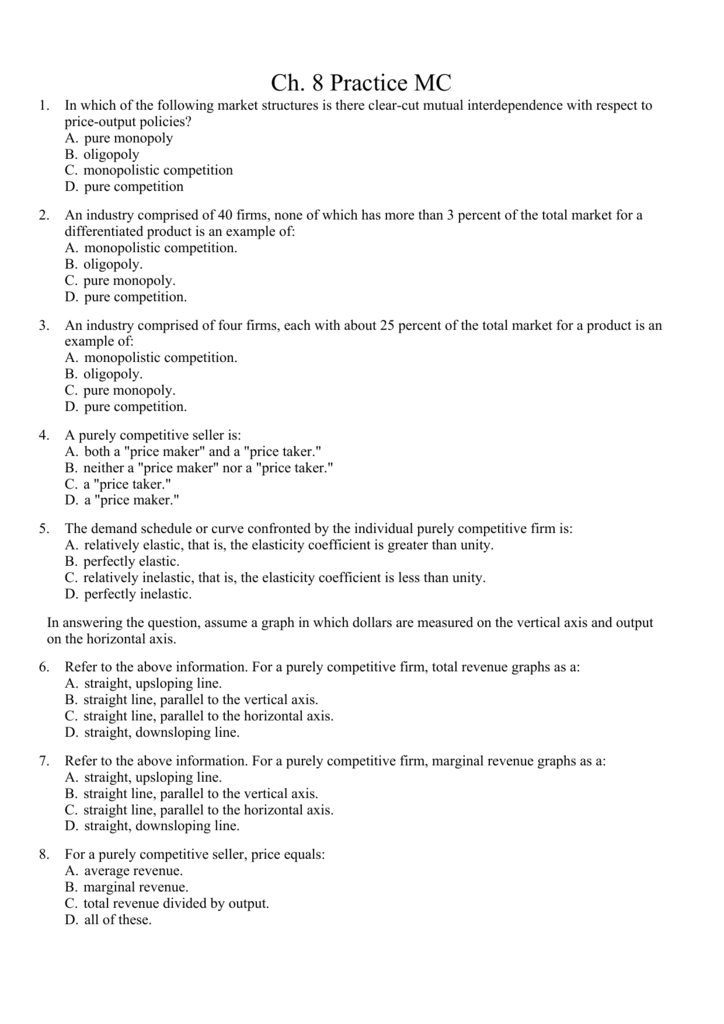



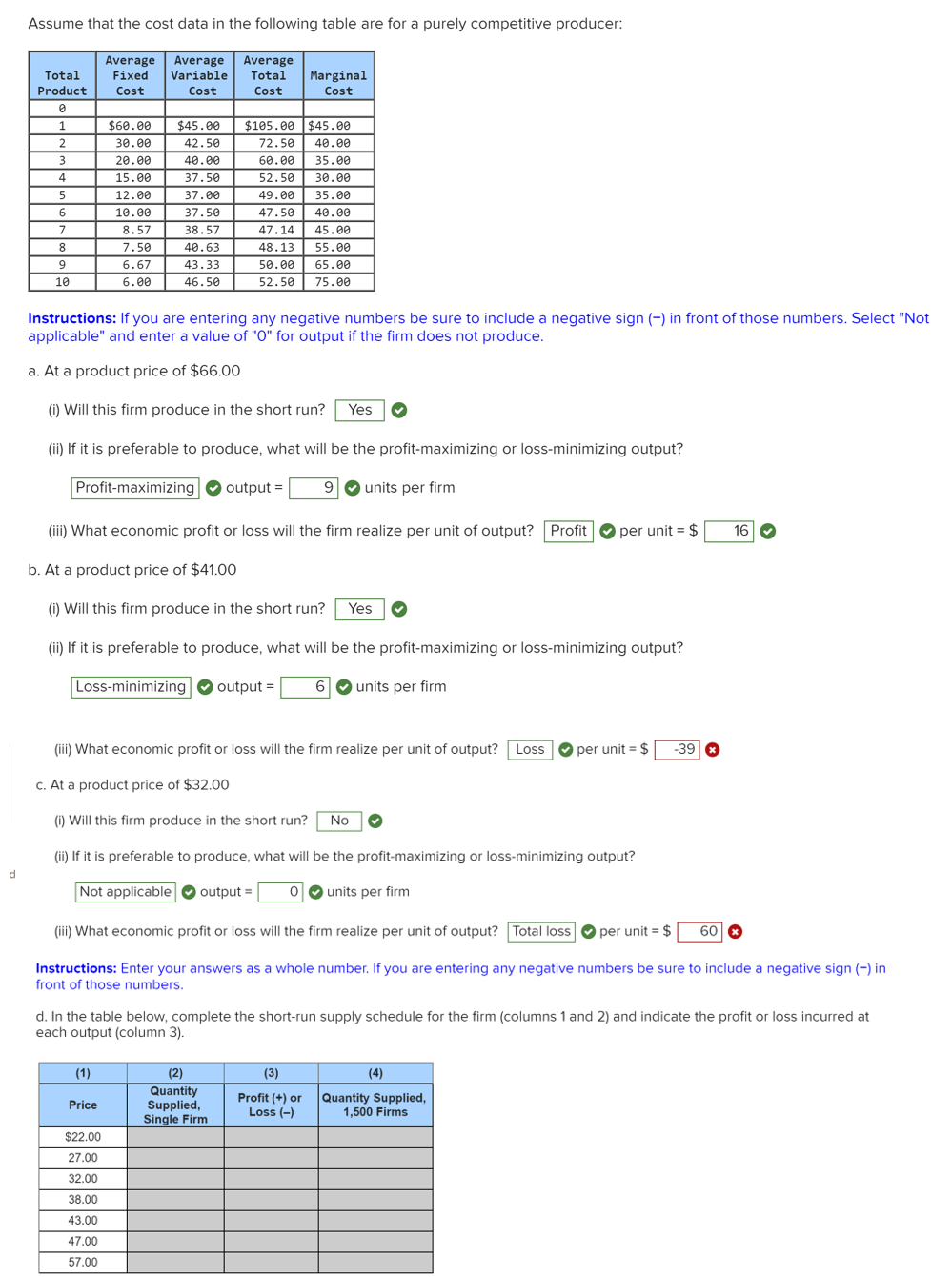



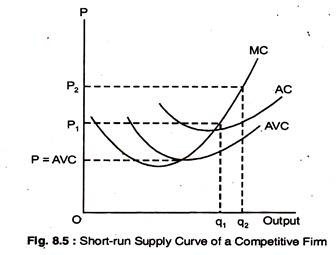
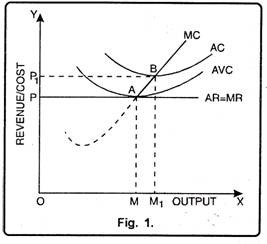
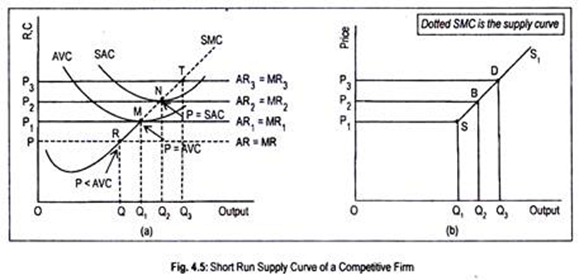
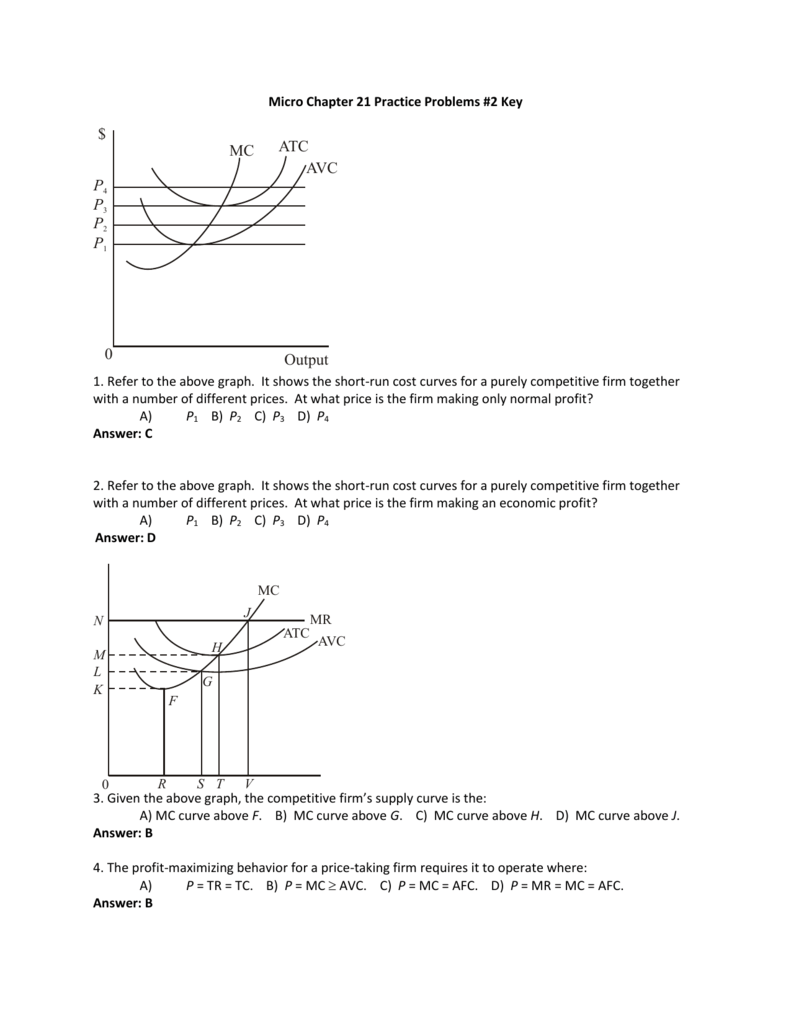



0 Response to "38 refer to the diagram for a purely competitive producer. the firm's short-run supply curve is:"
Post a Comment